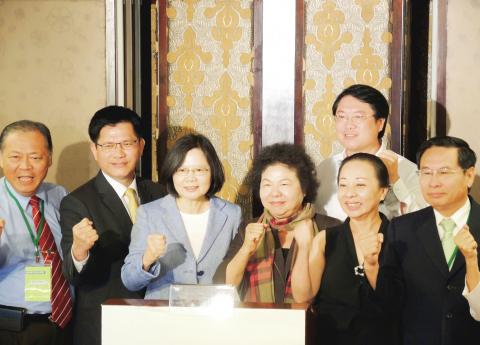Democratic Progressive Party (DPP) Chairperson Tsai Ing-wen (蔡英文) yesterday criticized Deputy Legislative Speaker Hung Hsiu-chu (洪秀柱) of recklessness in her cross-strait policy proposals after Hung accused Tsai of hiding her support for Taiwan’s independence to cheat voters.
“We should refrain from being reckless in cross-strait policies, as the public expects us to have platforms that are stable, predictable and in line with public opinion,” Tsai told reporters when asked to comment on Hung’s criticism of her cross-strait policies during a campaign event in Taichung. “These are the most fundamental principles that any policymaker should follow.”
Tsai went on to say that Hung has repeatedly changed her position on cross-strait issues, at times appearing reckless.

Photo: CNA
“It seems like it is the Chinese Nationalist Party (KMT) that is being reckless,” Tsai said.
Tsai was referring to the KMT presidential hopeful’s comments at a campaign event on Friday night, where Hung alleged that Tsai supports Taiwan’s independence, but does not dare publicly announce it, and is waiting to be elected to move forward on the issue.
Tsai made the remarks at a policy conference attended by all DPP local government heads except Tainan Mayor William Lai (賴清德), Pingtung County Commissioner Pang Meng-an (潘孟安), Yunlin County Commissioner Lee Chin-yung (李進勇) and Yilan County Commissioner Lin Tsung-hsien (林聰賢).
At the conference, Tsai and the local government heads agreed that once the party secures power in next year’s elections, it would strive to improve cooperation between central and local governments to bridge gaps, regardless of whether a region is governed by the DPP or the KMT.
The DPP also vowed to draw regional development plans to assist counties and cities according to local needs.

Taiwan is stepping up plans to create self-sufficient supply chains for combat drones and increase foreign orders from the US to counter China’s numerical superiority, a defense official said on Saturday. Commenting on condition of anonymity, the official said the nation’s armed forces are in agreement with US Admiral Samuel Paparo’s assessment that Taiwan’s military must be prepared to turn the nation’s waters into a “hellscape” for the Chinese People’s Liberation Army (PLA). Paparo, the commander of the US Indo-Pacific Command, reiterated the concept during a Congressional hearing in Washington on Wednesday. He first coined the term in a security conference last

A magnitude 4.3 earthquake struck eastern Taiwan's Hualien County at 8:31am today, according to the Central Weather Administration (CWA). The epicenter of the temblor was located in Hualien County, about 70.3 kilometers south southwest of Hualien County Hall, at a depth of 23.2km, according to the administration. There were no immediate reports of damage resulting from the quake. The earthquake's intensity, which gauges the actual effect of a temblor, was highest in Taitung County, where it measured 3 on Taiwan's 7-tier intensity scale. The quake also measured an intensity of 2 in Hualien and Nantou counties, the CWA said.

The Overseas Community Affairs Council (OCAC) yesterday announced a fundraising campaign to support survivors of the magnitude 7.7 earthquake that struck Myanmar on March 28, with two prayer events scheduled in Taipei and Taichung later this week. “While initial rescue operations have concluded [in Myanmar], many survivors are now facing increasingly difficult living conditions,” OCAC Minister Hsu Chia-ching (徐佳青) told a news conference in Taipei. The fundraising campaign, which runs through May 31, is focused on supporting the reconstruction of damaged overseas compatriot schools, assisting students from Myanmar in Taiwan, and providing essential items, such as drinking water, food and medical supplies,

New Party Deputy Secretary-General You Chih-pin (游智彬) this morning went to the National Immigration Agency (NIA) to “turn himself in” after being notified that he had failed to provide proof of having renounced his Chinese household registration. He was one of more than 10,000 naturalized Taiwanese citizens from China who were informed by the NIA that their Taiwanese citizenship might be revoked if they fail to provide the proof in three months, people familiar with the matter said. You said he has proof that he had renounced his Chinese household registration and demanded the NIA provide proof that he still had Chinese